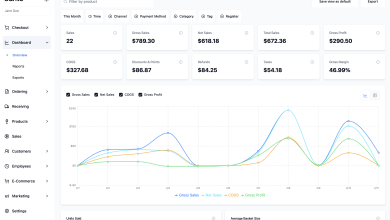
Understanding the modern consumer journey is more complex than ever in today’s fast-paced digital retail landscape. Shoppers no longer follow a straightforward path to purchase; instead, they engage with multiple channels and touchpoints—from social media and search engines to retailer websites and physical stores—before making a purchase decision. For retailers and brands, this shift presents both a challenge and an opportunity: to stay ahead, they must deliver a seamless experience, and compelling ads that ensure the right message reaches the right consumer at the right moment.
It’s clear that AI presents a big retail opportunity. AI uncovers patterns across different platforms, providing valuable insights into shopping behaviours by analysing vast amounts of consumer data in real time. This provides a different perspective on the landscape – it unpicks consumer behaviour and presents it back to us in a helpful way. Retailers can leverage these insights to assess consumer activity on their websites, refine marketing strategies, and enhance personalisation—driving stronger engagement and higher conversions.
Beyond insights, AI-powered technology is revolutionising retail marketing by improving cost-efficiency and optimising ad performance. By ensuring ad spend is allocated effectively, AI minimises waste while maximising impact. It also enables retailers and brands to track key performance indicators (KPIs) like conversion rates and return on ad spend (ROAS), ensuring campaigns meet their objectives.
The promise of ROI through AI integration
AI-driven strategies have precision in-built. But as the tools become more advanced, their capacity to be even more precise grows. This not only benefits retailers and brands but also enhances the shopping experience for consumers.
By delivering more relevant ads, AI helps brands improve engagement and increase the likelihood of conversions—ultimately driving a stronger ROAS. Shoppers are increasingly recognising the value of personalised and meaningful advertisements, reinforcing the impact of AI in modern marketing. According to Criteo’s Consumer Shopper research, 86% of global shoppers anticipate that AI will enhance the relevance of advertisements, ensuring they receive more personalised and meaningful content.
Additionally, over 80% of consumers believe that AI has the potential to promote ethical shopping practices by enabling greater transparency, reducing waste, and supporting sustainable brands. As businesses integrate AI-driven solutions, they can not only boost engagement and conversion rates but also build trust with consumers who prioritise responsible and efficient shopping experiences. This can make a real difference for retailers and brands when it comes to building long-lasting loyalty and customer retention.
The growing use of AI in advertising underscores its ability to refine targeting strategies, optimise marketing spend, and ultimately drive higher returns while aligning with consumer values. By analysing browsing history and purchase patterns, AI helps brands reach the right audiences with personalised ads.
Personalising the shopping experience
Generative AI is redefining how brands connect with consumers through unprecedented personalisation. AI tools can help retailers craft content tailored to individual preferences by data processing and automation.
Consumers expect increasingly customised interactions, so personalising the shopping experience has become a priority. AI-powered solutions enable retailers to meet these demands with tailored recommendations that enhance the shopping journey—AI can automatically determine which imagery and messaging perform best in real time, enhancing ad effectiveness. Retailers can tailor visuals for ads with AI by turning text-to-image prompts into branded visuals. If a retailer wants to promote a specific product, AI can be used to generate an image matching the prompt. AI can also adjust ad backgrounds with contextual images based on audience interests—resulting in tailored, relevant ad content. Say a retailer is looking to sell a tent, for example, these AI-generated backgrounds might show the tent at a festival, camping site, or fishing location, depending on audience preferences and predicted shopping behaviours.
Criteo’s research also reveals that 91% of global shoppers expect AI to personalise their recommendations within the next two years. Additionally, 87% of shoppers believe AI will gain a deeper understanding of their needs, enabling brands to provide more intuitive and seamless experiences. With growing consumer demand and trust in AI, retailers therefore have even more reason to invest in AI to personalise the shopping experience and boost ROAS.
By leveraging AI, retailers can analyse vast amounts of consumer data to predict preferences, refine product suggestions, and create hyper-personalised marketing strategies. This not only enhances customer satisfaction but also strengthens brand loyalty, and creates a meaningful and lasting relationship with the shopper in an increasingly competitive retail landscape.
AI-driven product discovery
Discovery is such a key part of the shopping journey. Where, when, and how to find products in the first place is another area where AI-driven solutions will change the way consumers find and engage with products and will, again, make the shopping experience more intuitive and efficient. By leveraging AI tools, retailers can foster customer loyalty by curating products that align with individual interests, making their brand synonymous with what consumers want.
Criteo’s research highlights the growing role of AI in this space, revealing that 49% of global shoppers already use ChatGPT for product discovery. This trend underscores AI’s potential to create meaningful connections between consumers and the products that best suit their needs. The goal is to enable retailers to capture consumer needs, anticipate purchase intent, and provide highly relevant product suggestions in real-time.
For example, if a consumer is searching for wood and nails, AI could infer that they might be interested in brackets for building shelves, thanks to access to their first-party data. Similarly, if the consumer is then also browsing for children’s toys, AI could allow retailers to combine these insights and recommend children’s shelves directly. While AI technologies are not quite at this level of predictive accuracy at scale yet, advancements in data analysis are bringing the industry closer to this vision. And as these technologies continue to evolve, AI-driven insights will empower retailers and brands to drive higher conversions and customer engagement, aligned to consumer values.
This level of hyper-relevance has the potential to transform the shopping experience over the next few years, making it more seamless, efficient, and satisfying for consumers – who will keep coming back for more.





